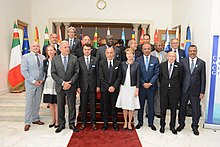Mohamed Bazoum
Mohamed Bazoum (* 1. January 1960 in Bilabrin , n'guigmi ) is a Nigerien politician . He was Niger's Foreign Minister from 1995 to 1996 and from 2011 to 2015 . He has been Niger’s Minister of the Interior since 2016 .
Life
Origin and family
Mohamed Bazoum belongs to the Arab minority in Niger. His family comes from Tesker .
He is married and has four kids.
Training and activity as a teacher
Mohamed Bazoum attended the Lycée Amadou Kouran Daga middle school in Zinder from 1975 to 1979 , from which he graduated with a Baccalauréat . From 1979 to 1984 he studied at the Department of Philosophy at the University of Dakar in Senegal . In 1983 he made a maîtrise in political philosophy and ethics and in 1984 a diplôme d'études approfondies in logic and epistemology .
From 1984 to 1991 he worked as a philosophy teacher at the Lycée Agabba secondary schools in Tahoua and Lycée Dan Baskoré in Maradi . In the 1980s he also worked as a senior official of the Nigerien teachers' union.
Political career
From the 1990s onwards, Bazoum became politically active in the Nigerien Party for Democracy and Socialism (PNDS-Tarayya). In 1991 he was appointed State Secretary for Cooperation in the government of Prime Minister Amadou Cheiffou . He was then elected in the parliamentary elections of 1993 in the special constituency of Tesker as a member of the National Assembly, as its second vice-president he served from 1993 to 1995. Bazoum was Minister for Foreign Affairs and Cooperation for the first time from 1995 to 1996. He initially remained in this office despite the coup by Ibrahim Baré Maïnassara - unlike Prime Minister Hama Amadou , who was replaced by Boukary Adji by Baré Mäinassara in early 1996 .
Bazoum served as an independent political advisor for eight years after leaving government. In 1998 he was detained by the police for a week. He was accused of being involved in a murder plot against President Baré Mäinassara. No charges were ever brought against him in this regard. From 2004 to 2009 Bazoum returned for his party as a member of the National Assembly. This time he was elected third vice-president of the National Assembly and served as vice-president of the parliamentary commission for international cooperation and conflict resolution. He also took a seat in the Pan-African Parliament for Niger . After the coup led by Salou Djibo , Bazoum was a member of the Nigerien interim parliament from 2010 to 2011.

After his party friend Mahamadou Issoufou had won the presidential elections in 2011 , Mohamed Bazoum was appointed Minister of State for Foreign Affairs, Cooperation, African Integration and Migrants in the government of Prime Minister Brigi Rafini on April 21, 2011 . Bazoum also took over the PNDS Tarayya leadership from Issoufou: initially on an interim basis, from 2013 as elected party leader. On February 25, 2015, his resignation from the government and Aïchatou Boulama Kané as his successor to the post of Foreign Minister were announced. Bazoum retained his position as chairman of the PNDS-Tarayya.
In the government of April 11, 2016, he became Minister of State for the Interior, Public Security, Decentralization, and Customs and Religious Affairs.
Honors
Web links
Individual evidence
- ↑ Abdourahmane Idrissa, Samuel Decalo: Historical Dictionary of Niger . 4th edition. Scarecrow, Plymouth 2012, ISBN 978-0-8108-6094-0 , pp. 96-97 .
- ↑ a b c Curriculum Vitae Bazoum. (PDF; 41 kB) Gouvernement de la République du Niger, accessed on August 14, 2020 (French).
- ↑ a b c Mohamed Bazoum, Ministre. Interview . In: Marchés Africains . Hors série n ° 52 - Special Niger. 2017, p. 28 .
- ↑ a b c CV Mohamed Bazoum. (PDF) Dansk Institut for Internationale Studier, archived from the original on January 8, 2013 ; accessed on November 7, 2019 (French).
- ^ US Department of State Country Report on Human Rights Practices 1998 - Niger. UNHCR, February 26, 1999, archived from the original on January 3, 2014 ; accessed on November 7, 2019 .
- ^ Niger: Le ministre des AE élu président du parti au pouvoir. In: Afriquinfos. December 30, 2013, archived from the original on January 2, 2014 ; accessed on November 7, 2019 (French).
- ↑ Niger / Diplomacy: Mme Aichatou Boulama remplace M. Bazoum Mohamed a la tête de la diplomatie nigérienne. In: Tamtaminfo.com. February 25, 2015, archived from the original on February 26, 2015 ; accessed on November 7, 2019 (French).
- ↑ Le Chef de l'Etat signe un décret portant nomination des membres du Gouvernement: Composition de la nouvelle équipe gouvernementale. In: Le Sahel . April 12, 2016, archived from the original on April 16, 2016 ; accessed on November 7, 2019 (French).
| personal data | |
|---|---|
| SURNAME | Bazoum, Mohamed |
| BRIEF DESCRIPTION | Nigerien politician, Foreign and Interior Minister Niger |
| DATE OF BIRTH | January 1, 1960 |
| PLACE OF BIRTH | Bilabrin , N'Guigmi |
